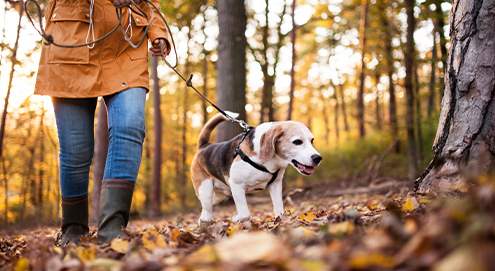What shouldn’t my dog eat?
Written by Rianne |
When we talk about things that a dog should not eat, we often immediately think of poisonous things, such as chocolate or rat poison. Unfortunately, there are also many other home, garden and kitchen items that can be dangerous for your four-legged friend. In this article, you can read everything about which products these are.

Which items in and around the house can be dangerous for your dog?
There are countless things in the house that can cause problems. These often look very harmless, so you don’t always realize that they can pose a danger. Below is a list of things to keep in mind at home:
Plants and flowers: certain plants and flowers can cause issues as soon as they are eaten by a dog. In some cases, chewing a twig or leaf is enough to cause symptoms. Always check before purchasing a plant or flower whether it can be dangerous for your dog. In our article “Which Plants Are Poisonous to Your Dog?” you can read which plants are dangerous for your four-legged friend.
Cleaning products: We’re not just talking about cleaning or disinfecting agents, but about (dish) cloths and sponges. These products have an absorbent function. This can cause a major blockage in the stomach or intestines. If not treated in time, surgery is often the only option.
Food scraps: the leftovers after eating or that unused raw meat. Dogs often do not tolerate the food products that we eat. Do you want to know which products are toxic for your dog? Read our article “What is toxic to your pet“.
Things in the garden: As mentioned before, certain plants and flowers can cause problems. However, animals such as frogs, snails or toads can also cause problems. These animals can very easily carry worms. The French Heartworm is a worm that we often encounter in these animals. Toads can carry toad poison which can cause problems.
Dead animals: Does your dog hunt or is he easily attracted to a dead animal by the water or the road? Then don’t let him eat it! In addition to the large number of bacteria that it contains, the cause of death of the dead animal can also be a reason why your dog can get sick. Botulism is especially common in water birds. Botulism is caused by a poison that blocks the nerves. This can lead to paralysis resulting in death.
Faeces: Not only the faeces of other animals but also that of humans pose risks if your dog eats it. Common complaints are worms, but there can also be remnants of drugs or other toxic things (such as medicine residues) in the stool. This in itself poses other dangers.
Strange objects: no matter how nice that new toy is, if you have a real wrecker in the house, everything has to break. This is also a danger. Because your dog destroys his toys, he can also eat part of it. This can cause problems in the stomach and intestines if it does not pass through the intestinal tract properly. Of course, this does not only apply to toys, but also to socks, towels, pillows, etc.
What can you do yourself to prevent your dog from ingesting something?
Tidy! It sounds so simple. However, cleaning up is one of the easiest options to prevent your dog from eating things he shouldn’t. But what about when you walk outside?
If you know that your own dog easily picks up and/or tries to eat things from the street, the Trixie Bait Protection Muzzle can be a useful tool. This soft muzzle makes it difficult for your four-legged friend to eat things from the street. Please note: A muzzle is a tool, not a solution. In addition to using the muzzle, it is wise to train your dog to focus on you instead of things on the street.
What should I do if my dog has eaten something he should not have?
It can sometimes happen that things go wrong. For example, you lost a sock and are almost certain that your dog ate it. In all cases, it is necessary to go to the vet. Your vet can best estimate the consequences for your dog and initiate treatment. Always try to indicate what your dog has eaten and how much. Product packaging can help with this!
Do you have any questions about things that your dog should not eat based on this article? Please contact our veterinarian via WhatsApp (0031 850871821) or via email: veterinarian@vetsend.co.uk.



